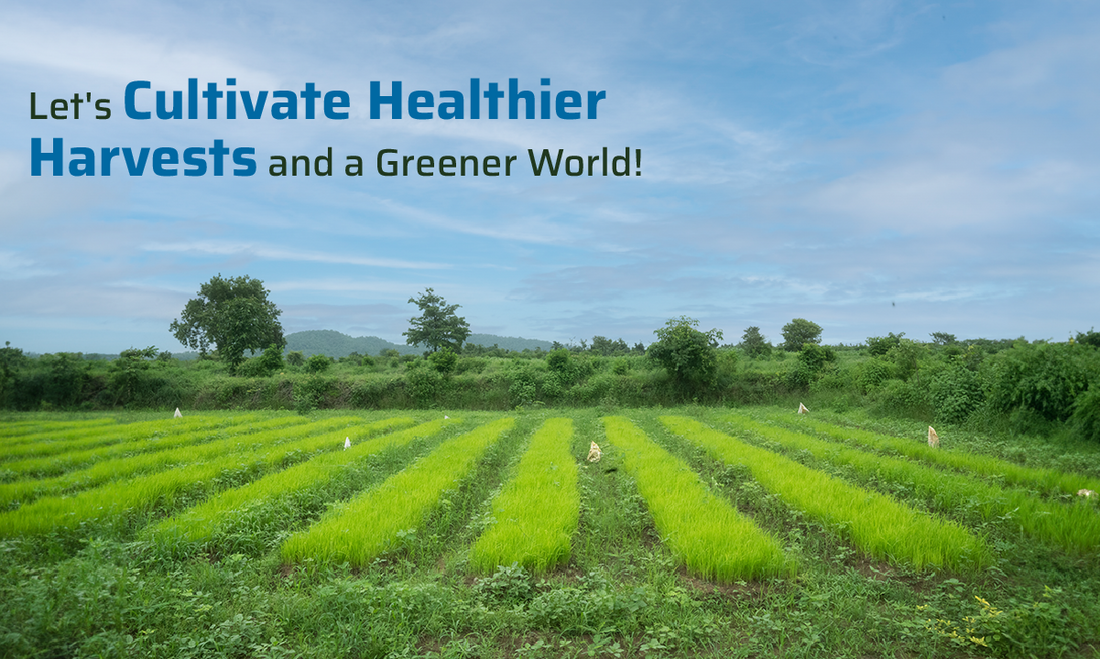Advantages of Organic Farming : Sustainable Farming Benefits
Info Organic 5 min read
In today's fast-paced world, where environmental concerns loom large and sustainability takes center stage, organic agriculture has emerged as a shining beacon of hope. In a world burdened by chemicals, the need of organic farming is more pressing than ever.
With growing awareness about the adverse effects of conventional agricultural practices on our environment, organic farming advantages have taken the spotlight like never before.
So, what are the benefits of organic farming, and why is organic-based farming important? The organic method of farming, also known as organic agriculture, is a method that emphasizes the use of natural processes, avoiding chemical fertilizers and pesticides.
Instead, it relies on eco-friendly alternatives that work in harmony with nature. By prioritizing soil protection and water conservation, organic farmers nurture the very foundation on which their crops flourish.
Table of Contents
- Introduction
- How Is Organic Farming Beneficial to the Environment?
- What are the Advantages of Organic Farming?
- Important Methods of Organic Farming
- How to Practice Sustainable Organic Farming?
- Conclusion
The benefits of organic farming extend far beyond just producing chemical-free food. The environment breathes a sigh of relief as harmful chemicals are kept at bay, reducing soil contamination and water pollution. Organic agriculture also fosters biodiversity, providing a safe haven for various plant and animal species.
Moreover, by avoiding the use of synthetic hormones and antibiotics, organic farming ensures healthier living conditions for the animals involved. Farmers play a pivotal role in this sustainable approach. They actively participate in nurturing the ecosystem, making it more resilient and robust.
As a result, organic agriculture does not just offer immediate advantages but secures a greener future for generations to come.

In this blog, we will delve deeper into the multifaceted uses of organic farming and explore why organic method farming is important for the environment, our health, and the overall well-being of our planet.
Join us as we celebrate the wonders of organic-based farming, unveiling organic agriculture advantages and the multitude of benefits organic farming brings to our lives.
How Is Organic Farming Beneficial to the Environment?
In today's rapidly evolving world, the call for sustainable practices is more significant than ever. Organic agriculture emerges as a powerful solution, offering a myriad of benefits of organic farming to both the environment and society. Organic agriculture uses extend beyond nourishing bodies; they nurture the earth itself.
The advantages of organic farming go beyond yielding healthy crops. By shunning chemical fertilizers and pesticides, organic farmers champion soil protection and water conservation.
According to the Food and Agriculture Organization of the United Nations, “In many agricultural areas, pollution of groundwater courses with synthetic fertilizers and pesticides is a major problem. As the use of these is prohibited in organic agriculture, they are replaced by organic fertilizers (e.g., compost, animal manure, green manure) and through the use of greater biodiversity, enhancing soil structure and water infiltration.”
This eco-friendly approach nurtures the soil, enriching it with essential nutrients, and ensures minimal harm to precious water resources. Not only does organic farming safeguard the health of the soil, but it also plays a crucial role in preserving biodiversity.
With an emphasis on natural methods, this method allows ecosystems to flourish, fostering a harmonious coexistence between agriculture and nature.
Organic farming's relevance extends beyond the immediate benefits of organic farming; it addresses the urgent need for organic agriculture. By promoting organic practices, we reduce our reliance on harmful chemicals that often find their way into the environment and impact animals, plants, and humans alike.
The importance of organic farming lies in its role as a catalyst for a greener future, where farmers become stewards of the land, employing eco-friendly techniques to nurture the earth and its inhabitants.
In conclusion, organic farming uses, and advantages make it a vital pillar of organic agriculture. By supporting organic farmers and choosing organic products, we actively contribute to the preservation of the environment, safeguarding our planet for generations to come.
Embracing organic agriculture is not just a choice; it's a responsibility we owe to the Earth and its inhabitants - a step towards a healthier, cleaner, and greener world. So let's come together and embrace organic agriculture to nurture the planet and cultivate a brighter future. Recognizing the need of organic farming is a step towards a healthier ecosystem.
What are the Advantages of Organic Farming?

The advantages of organic farming are bountiful and ever-rewarding. Organic-based farming benefits the planet, farmers, and consumers alike, making it a sustainable and environment-friendly alternative to conventional agriculture.
Sustainable agriculture with the advantages of organic farming paves the way for a greener future. Embracing organic method farming isn't just a trend; it's a necessity for the future. Let's explore the numerous advantages that make organic farming a win-win for everyone involved.
Soil Protection:
One of the primary benefits of organic farming is its commitment to soil health. By avoiding chemical fertilizers and pesticides, organic farmers protect the natural composition of the soil, promoting biodiversity and preserving essential microorganisms vital for nutrient-rich crops. From enriching soil health to safeguarding biodiversity, the uses of organic farming are diverse and impactful.
Water Conservation:
Organic agriculture practices prioritize water conservation. By using natural irrigation methods, crop rotation, and mulching, farmers can reduce water consumption, ensuring that this precious resource is utilized efficiently and sustainably.
Environmentally Friendly:
Want to make a positive impact on the environment? That's why organic farming is essential. Organic farming actively promotes biodiversity and the well-being of ecosystems. By steering clear of harmful chemicals, it minimizes pollution and helps preserve wildlife, ensuring a harmonious coexistence between agriculture and nature.
Supports Farmers' Livelihood:
Organic farming empowers farmers by reducing their dependence on expensive chemical fertilizers and pesticides. By adopting organic practices, farmers can potentially increase their profits and improve their economic stability.
In the embrace of organic farming, a beautiful bond blossoms, empowering our cherished farmers. Freed from costly chemicals, they cultivate hope and harmony with the land.
AsmitA Organic Farms, guided by love for our planet, gratefully pledges 2% of revenue to these unsung heroes. Each purchase nurtures not just our Earth but the lives of those tending it—small farmers, the heart and soul of our shared journey. Together, we sow seeds of change, embracing a brighter, sustainable future for all.
Safer Crop Production:
Organic crops are free from harmful chemical residues, making them safer for farmers to grow and consumers to consume. Organic farming is an ideal way to produce wholesome, pesticide-free food, such as every day cereals and pulses, contributing to healthier diets and reducing the risk of health-related issues.
Long-Term Sustainability:
Sustainable organic farming practices focus on the long-term rather than short-term gains. By emphasizing crop rotation, natural pest control, and composting, organic farming ensures that the land remains fertile for future generations.
Health Benefits of Organic Farming:
Organically grown crops are rich in essential nutrients, contributing to improved human health. Additionally, consuming food free from chemical additives and pesticides may reduce the risk of certain diseases and allergies.
Animal Welfare:
Organic farming benefits extend to animals too. By promoting pasture-based systems and prohibiting the use of growth hormones and antibiotics, organic agriculture ensures that farm animals are treated ethically and humanely. The cattle are free to roam, and the cows are grass-fed to get finesse, such as Cow Ghee.
Carbon Sequestration:
Organic farming plays a vital role in mitigating climate change. By promoting healthier soil with higher organic matter, carbon is sequestered from the atmosphere and stored in the ground, thus reducing greenhouse gas emissions.
Climate Resilience:
Organic farming has proven to be more resilient in the face of extreme weather events. Organic farms tend to have better water retention, reduced soil erosion, and enhanced adaptability to changing environmental conditions.
Organic farming holds the key to a sustainable future. Its myriad benefits, from preserving soil health and conserving water to providing healthier and safer food options, highlight its importance.
By choosing organic products, consumers can support farmers, protect the environment, and contribute to a more resilient and balanced ecosystem. Embrace the organic movement and be a part of the positive change for a greener and healthier planet.
Important Methods of Organic Farming
Organic farming employs a variety of methods to cultivate crops and raise animals in a sustainable and eco-friendly manner. Each method is designed to work in harmony with nature and minimize the use of synthetic inputs. Here are some key methods used in organic farming, along with explanations for each:
Crop rotation:
Crop rotation involves systematically changing the type of crops grown in a particular field each season. This helps maintain soil fertility, prevent the build-up of pests and diseases, and reduce the need for chemical inputs. Different crops have different nutrient needs, and rotating them ensures that the soil is not depleted of specific nutrients.
Composting:
Composting is the process of converting organic waste, such as crop residues, kitchen scraps, and animal manure, into nutrient-rich compost. Compost serves as a natural fertilizer, adding essential nutrients to the soil and improving its structure. It also enhances the soil's water-holding capacity and promotes beneficial microbial activity.
Green manure cover crops:
Green manure crops, such as legumes, are grown specifically to be plowed back into the soil while they are still green. These cover crops add organic matter, fix nitrogen from the air into the soil, and improve soil health. When plowed under, they release nutrients slowly, benefiting the subsequent crops.
Biological pest control:
Organic farmers use natural predators, beneficial insects, and other organisms to control pests and diseases. By promoting biodiversity, they create a more balanced ecosystem where pests are kept in check naturally, reducing the need for chemical pesticides.
Mulching:
Mulching involves covering the soil around plants with materials like straw, leaves, or grass clippings. Mulch helps retain soil moisture, suppress weeds, and regulate soil temperature. It also prevents soil erosion and promotes a healthier environment for beneficial soil organisms.
Integrated Pest Management (IPM):
IPM is a comprehensive approach to managing pests that combines preventive measures, biological control, cultural practices, and, if necessary, the judicious use of least-toxic pesticides. The goal is to minimize pest damage while safeguarding human health and the environment.
Natural weed control:
Organic farmers use various methods to control weeds without synthetic herbicides, such as hand weeding, hoeing, and mechanical cultivation. Mulching and cover crops can also help suppress weed growth.
Non-GMO seeds:
Organic farmers use non-genetically modified seeds to maintain biodiversity and preserve traditional crop varieties. This prevents potential risks associated with genetically modified organisms and helps safeguard the environment and human health.
Animal husbandry practices:
Organic animal farming emphasizes providing animals with access to open spaces, natural habitats, and a diet that is free from genetically modified organisms, antibiotics, and growth hormones. It also promotes ethical treatment and considers the overall well-being of the animals. From compost to cow dung, manures fuel the growth of sustainable agriculture.
Water conservation:
Organic farming practices such as mulching, drip irrigation, and rainwater harvesting are used to minimize water usage and improve water efficiency on the farm.
These methods of organic farming prioritize environmental sustainability, soil health, and natural resource conservation. By adopting these practices, organic farmers contribute to healthier ecosystems, reduced environmental impact, and the production of nutritious and safe food.
How to Practice Sustainable Organic Farming?
In an era where environmental consciousness takes center stage, Sustainable Organic Farming emerges as the beacon of agricultural practices that not only produce wholesome food but also nurture the Earth. Are you ready to join the ranks of responsible farmers and embrace a greener, more sustainable way of farming? Here's how you can do it in six simple steps:
Embrace Soil Health:
The foundation of every successful organic farm lies in healthy soil. Ditch synthetic fertilizers and opt for organic compost, green manure, and natural amendments. These nourish the soil, enhance its fertility, and foster a thriving ecosystem for your crops.
Crop Rotation & Biodiversity:
Avoid monoculture, the practice of cultivating a single crop. Instead, practice crop rotation to minimize soil depletion and prevent pest infestations. Embrace biodiversity by planting a variety of crops, which promotes natural pest control and strengthens the overall resilience of your farm.
Say No to Harmful Chemicals:
Pesticides and herbicides not only harm beneficial insects and wildlife but also seep into our water systems. Embrace natural alternatives like neem oil, diatomaceous earth, and biological pest control methods to safeguard your crops and the environment.
Water Management:
Sustainable water usage is vital for an eco-conscious farm. Implement water-efficient irrigation systems, like drip irrigation, to minimize water wastage and maintain healthy crop hydration.
Composting & Recycling:
Turn kitchen scraps, farm residues, and animal waste into valuable compost. Composting reduces waste, enriches the soil, and completes the cycle of sustainability on your farm.
Engage the Community:
Collaboration is the key to a sustainable future. Connect with local communities, farmers' markets, and consumers who share your passion for organic produce. Educate them about the benefits of sustainable farming and build a strong network of like-minded individuals.
By adopting Sustainable Organic Farming, you're not just cultivating crops – you're sowing the seeds of a brighter, healthier tomorrow. The ethical treatment of animals is at the heart of every organic farming endeavor.
When animals are cared for naturally, they reward us with wholesome produce in return. Let nature be your guide, and together, we can cultivate a future that thrives in harmony with the Earth!
In conclusion, the spotlight on organic farming reveals a bountiful harvest of advantages and benefits. The importance of organic farming lies in preserving our planet's health and future. From nurturing healthier ecosystems and safeguarding biodiversity to delivering nutrient-rich produce to our tables, it's a sustainable win-win for both our health and the planet.
Embracing organic practices empowers us to cultivate a brighter, greener future for generations to come. The growing awareness of the importance of organic farming is reshaping our food choices So, let’s go organic and grow responsibly!


